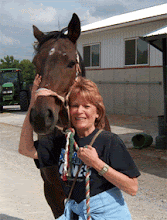CHICAGO - Wyoming resident, Patricia Fazio, Ph.D. has filed a complaint with state officials, requesting an investigation of alleged violations of ethics laws and securities fraud by Wyoming State Rep. Sue Wallis (R-Campbell).
Animal Law Coalition (ALC), Equine Welfare Alliance (EWA) and Habitat for Horses Advisory Council (HfHAC) applaud Dr. Fazio and join in the call for authorities to investigate Wallis' activities.
The complaint alleges Rep. Wallis is improperly and even fraudulently abusing her position as a Wyoming legislator. The complaint further alleges that Rep. Wallis not only neglected to recuse herself or disclose her personal financial interest in votes, but that she has actually "sponsored" bills that would materially benefit her or her family.
Wallis has publicly claimed to be forming a business under the name, Unified Equine LLC, which she says will slaughter horses and sell the meat within Wyoming. At the same time, in her capacity as a legislator, she is promoting legislation that would deregulate, promote and favor horse slaughter operations.
Wallis published a web page enticing people to invest in Unified Equine LLC which turned out to be a non-existent entity for months. Also according to the Complaint, the apparent solicitation for investors may have violated other federal and state securities laws.
The fraud on investors may go deeper: Not only is commercial horse slaughter for human consumption illegal in the U.S., as the complaint states, "there is no market in the U.S. for human consumption of horsemeat, nor is there a market for use of horsemeat in pet food". To be a viable business within Wyoming with its population of 544,270, such a facility "would have to ...sell approximately 10,000,000 pounds of horsemeat per year, or 18 pounds for every man, woman and child in the state".
Wallis has also sponsored the "Food Freedom Act", a bill that would eliminate all regulation of food sold directly to the consumer. The bill was dubbed by one health department official as a "fraud".
The bill could allow Wallis' slaughter business to sell contaminated horse meat directly to Wyoming consumers without any form of government oversight, testing or inspection. American horses are not raised for food and are typically administered drugsincluding carcinogens that, according to the FDA, are prohibited in horsemeat sold as human food.
The deceptively named Food Freedom Act would likely also benefit Wallis' family's business which sells homemade jellies and syrups, among other food goods.
The complaint further calls into question Wallis' use of 501(c)3 charitable designations to solicit funds for her promotion of horse slaughter. Wallis has a number of ever-changing, interrelated organizations and websites that solicit funds for allegedly "charitable" or "educational" purposes. But Wallis' efforts appear to be purely political, focused on passing laws from which she can benefit personally and financially.
It is not clear where donations are actually going, and Dr. Fazio requests an investigation into possible commingling of tax exempt and non-tax exempt funds. Wallis has also openly touted her position as a legislator to solicit funding for pro-horse slaughter interests.
Most recently, Wallis has announced she is holding a pro-horse slaughter "summit" in Las Vegas with a hefty price tag for attendees. She was to announce the winner of a raffle for a new pick-up truck. Then according to the complaint, Wallis announced she may not be able to buy the truck and asked raffle participants if she could just keep the money from ticket sales. According to the complaint, Wallis may be "running an unlicensed lottery, and at worst she has attempted to defraud those who bought the tickets at $100 apiece."
According to the Wyoming Minority Floor Leader Rep. W. Patrick Goggles, the complaint has been referred to the Legislative Service Office for review. Dr. Fazio also requested the Wyoming Attorney General as well as the Secretary of State's ethics disclosure and compliance offices to investigate these allegations.



















